Armenian Studies at Columbia
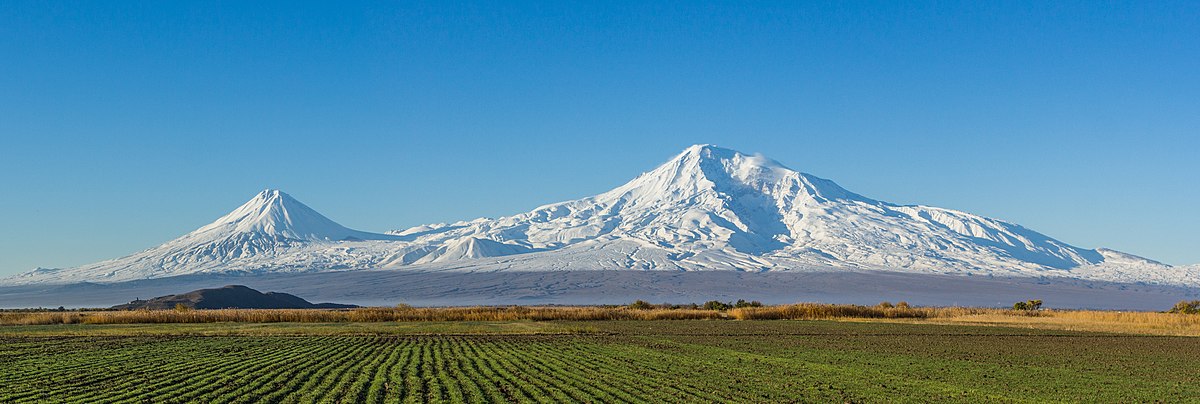
Armenian Studies has a long and celebrated history at Columbia University. This page draws together the many events and announcements related to the Armenian Studies community. If you have questions about the program, please contact Alison Vacca at av3096@columbia.edu.
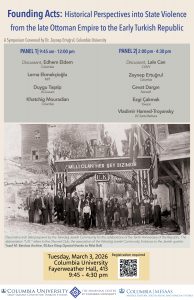 |
Founding Acts: Historical Perspectives into State Violence from the Late Ottoman Empire to the Early Turkish Republic
When: 3 March 2026 from 9:45am to 4:30pm
Where: Fayerweather Hall 413
Organized by: Zeynep Ertuğrul, Sakıp Sabancı Center for Turkish Studies
The full program is available here.
|
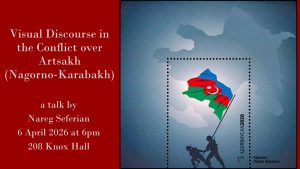 |
Visual Discourse in the Conflict over Artsakh (Nagorno-Karabakh)
Who: Nareg Seferian
When: 6 April 2026 at 6pm
Where: 208 Knox Hall
|
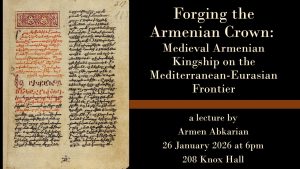 |
Forging the Armenian Crown: Medieval Armenian Kingship on the Mediterranean-Eurasian Frontier
Who: Armen Abkarian
When: 26 January 2026 at 6pm
Where: 208 Knox Hall
|
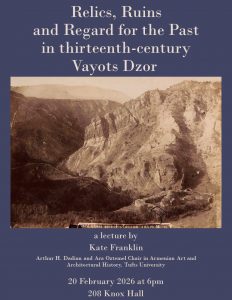 |
Relics, Ruins and Regard for the Past in thirteenth-century Vayots Dzor
Who: Kate Franklin
When: 20 February 2026 at 6pm
Where: 208 Knox Hall
|
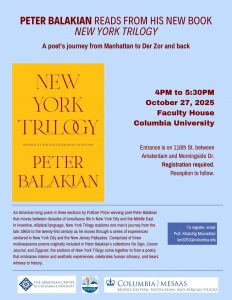 |
Peter Balakian Reading from New York Trilogy
Who: Peter Balakian
When: 27 October at 4pm
Where: Faculty House
Organized by the Armenian Center, NAASR, and MESAAS
|
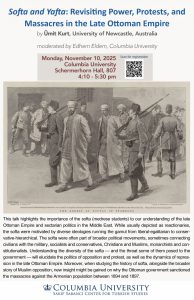 |
Softa and Yafta: Revisiting Power, Protests, and Massacres in the Late Ottoman Empire
When: 10 November 2025 at 4:10pm
Where: 807 Schermerhorn Hall
Organized by the Sabanci Center
|
 |
Book Talk on The Armenian Woman, Minoritarian Agency, and the Making of Iranian Modernity
Who: Houri Berberian & Talinn Grigor
When: 24 March 2025 at 6pm
Where: 208 Knox Hall
|
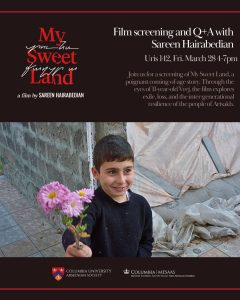 |
My Sweet Land
Film Screening and Q&A with Sareen Hairabedian
When: 28 March at 4pm
Where: 142 Uris Hall
Organized by the Armenian Society
|
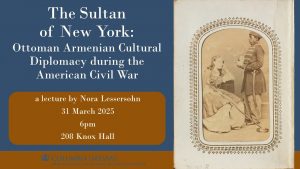 |
The Sultan of New York: Ottoman Armenian Cultural Diplomacy during the American Civil War
Who: Nora Lessersohn
When: 31 March at 6pm
Where: 208 Knox Hall
|
 |
“To Go On Living”: Public Reading and Conversation with Narine Abgaryan
When: 28 April 2025 at 5pm Organized by Knar Abrahamyan, sponsored by the Harriman Institute, Armenian Center, MESAAS, and the Heyman Center for the Humanities |
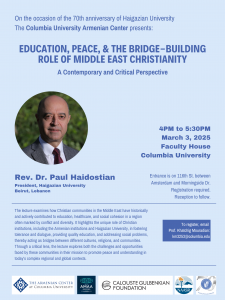 |
Education, Peace, and the Bridge-Building Role of Middle East Christianity: A Contemporary and Critical Perspective
Who: Rev. Dr. Paul Haidostian
When: 3 March 2025 at 4pm
Where: Faculty House
Organized by Khatchig Mouradian, sponsored by the Armenian Center, AMAA, Calouste Gulbenkian Foundation, NAASR, and Haigazian University
|
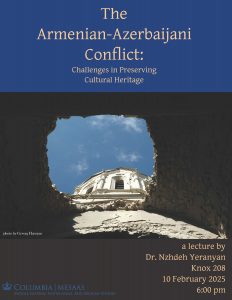 |
The Armenian-Azerbaijani Conflict: Challenges in Preserving Cultural Heritage
Who: Nzhdeh Yeranyan
When: 10 February 2025 at 6pm
Were: 208 Knox Hall
|
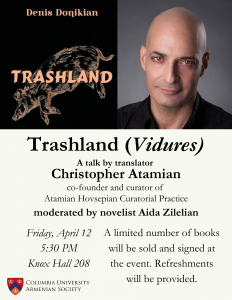 |
Trashland
Who: Christopher Atamian When: 12 April 2024 at 5:30pm Where: 208 Knox Hall Organized by: CU Armenian Society |
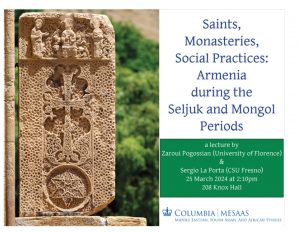 |
Saints, Monasteries, Social Practices: Armenia during the Seljuk and Mongol Periods
Who: Zaroui Pogossian (University of Florence) & Sergio La Porta (CSU Fresno)
When: 25 March 2024 at 2:10pm
Were: 207 Knox Hall
|
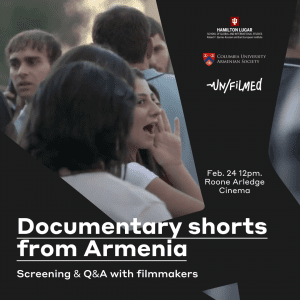 |
Film Screening
On Saturday, February 24th from 12 to 2 PM, the Armenian Society will be hosting a screening of several documentary shorts by Armenian filmmakers in collaboration with the Hamilton Lugar School of Global and International Studies at Indiana University and the Un/Filmed documentary school.
The films are the product of a weeklong workshop that took place at the end of September in Yerevan, one week after Azerbaijan took control of Nagorno-Karabakh (Artsakh). During the workshop, the participants developed, filmed and edited short 5 – 10 minute documentaries on topics such as post-Soviet transformation, relations of the former Soviet republics with Russia, and recent developments in Nagorno-Karabakh.
|
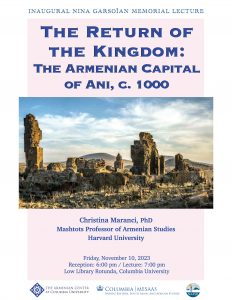 |
The Return of the Kingdom: The Armenian Capital of Ani, c. 1000
Who: Christina Maranci When: 10 November 2023 at 7pm Where: Low Library Rotunda Organized by the Armenian Center and NAASR
|
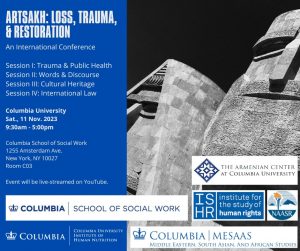 |
Artsakh: Loss, Trauma, & Restoration
When: 11 November, 9:30am – 5pm Where: Columbia School of Social World, 1255 Amsterdam Ave. Organized by the Armenian Center and Columbia School of Social Work; co-sponsored by the Institute for the Study of Human Rights, and MESAAS |
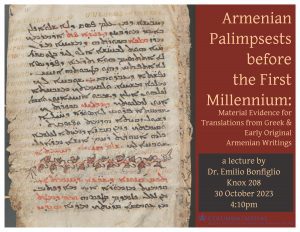 |
Armenian Palimpsests before the First Millennium: Material Evidence for Translations from Greek and Early Original Armenian Writings
Who: Emilio Bonfiglio When: 30 October 2023 Where: Knox Hall 208 |
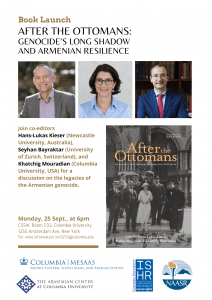 |
After the Ottomans
Who: Hans-Lukas Kieser (Newcastle University, Australia), Seyhan Bayraktar (University of Zurich, Switzerland), and Khatchig Mouradian (Columbia University) When: 25 September 2023, 6-7:30pm Where: School of Social Work, 1255 Amsterdam Ave., Room C03 Organized by Khatchig Mouradian |
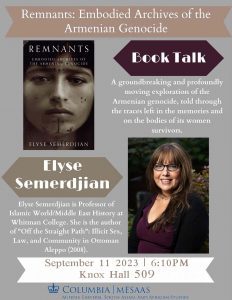 |
Remnants Book Talk
Who: Elyse Semerdjian When: 11 September 2023 at 6:10pm Where: Knox Hall 509 |
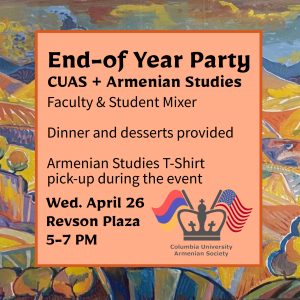 |
CUAS End-of-Year Party
We are hosting an end-of-year event celebrating all things Armenian at Columbia! It is an outdoor event, so any and all involved with the community in some way can attend. Dinner, beverages, and desserts will be served, and free shirts will be distributed at the event! Who: Columbia University Armenian Society When: 26 April 2023, 5-7:00 pm Where: Revson Plaza |
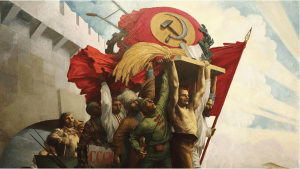 |
Unsettling the Union: An Interdisciplinary Symposium
Who: the Heyman Center, organized by Knar Abrahamyan When: 14 April 2023 from 9:00am to 8:00pm Unsettling the Soviet Union’s “friendship of the peoples” paradigm, this symposium foregrounds the perspectives of the marginalized ethnic and racial groups by bringing together scholars from various disciplines to offer novel methods and theories for analyzing the Soviet Union as a colonial empire: anthropology, ethnomusicology, history, literary studies, and Slavic studies. Participants will present papers that interrogate themes including colonial resistance, cultural assimilation, nation building, historical memory, and environmental colonialism. The variety of themes and disciplinary approaches will converge around efforts to interpret the relationship between hegemonic techniques of rule and the various modes of subversion and resistance that ethnic and racial minorities had exercised to withstand oppression. |
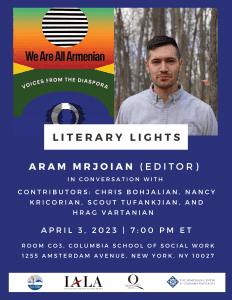 |
Literary Lights: We Are All Armenian
Who: Aram Mrjoian, Chris Bohjalian, Nancy Kricorian, Scout Tufankjian and Hrag Vartanian When: 3 April 2023 at 7:00pm We Are All Armenian brings together established and emerging Armenian authors to reflect on the complications of Armenian ethnic identity today. These personal essays elevate diasporic voices that have been historically silenced inside and outside of their communities, including queer, multiracial, and multiethnic writers. The eighteen contributors to this contemporary anthology explore issues of displacement, assimilation, inheritance, and broader definitions of home. Through engaging creative nonfiction, many of them question what it is to be Armenian enough inside an often unacknowledged community. Organized by Khatchig Mouradian |
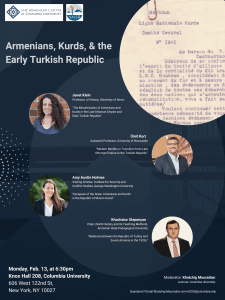 |
Armenians, Kurds, and the early Turkish Republic
Who: Janet Klein, Ümit Kurt, Amy Austin Holmes, Khachatur Stepanyan, organized and moderated by Khatchig Mouradian When: 13 February 2023 Organized by Khatchig Mouradian |
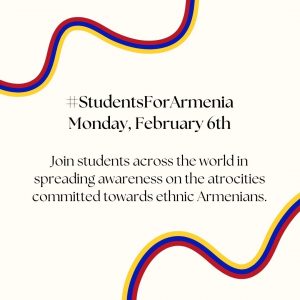 |
Artsakh Informational Session
Who: the Columbia University Armenian Society When: 6 February 2023
|
Knar Abrahamyan
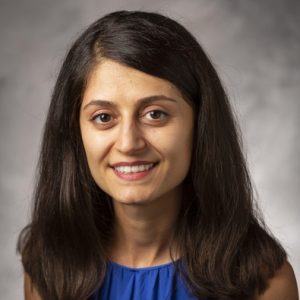
Knar Abrahamyan (Ph.D., Music Theory, Yale University) is a post-doctoral fellow at Columbia’s Society of Fellows for the 2022-3 academic year, after which she will join the Department of Music as Assistant Professor in Music Theory and Race. Dr. Abrahamyan is a music scholar whose work examines the historical and political entanglements of cultural production. Her book project, Opera as Statecraft in Soviet Armenia and Kazakhstan, re-envisions Soviet music history by analyzing the power dynamics between the state and its ethnic and racial Others. It explores opera as a contested imperial space through which the Soviet state pursued colonial subjugation under the guise of cultural modernization. Dr. Abrahamyan has presented at major national and international conferences, and her work on Soviet music and politics appeared in the DSCH Journal and a collected volume, Analytical Approaches to 20th-Century Russian Music.
Charry Karamanoukian
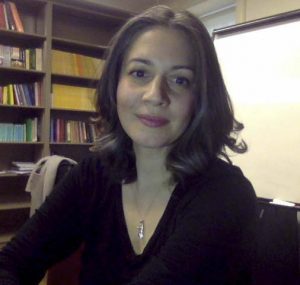 Charry Karamanoukian is Lecturer of Armenian language in the Department of Middle Eastern, South Asian, and African Studies.
Charry Karamanoukian is Lecturer of Armenian language in the Department of Middle Eastern, South Asian, and African Studies.
Contact: ck2444@columbia.edu
Khatchig Mouradian
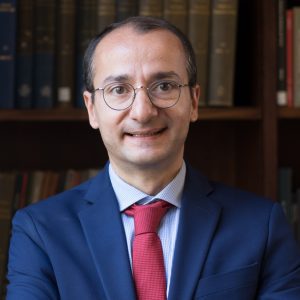
Khatchig Mouradian is a lecturer in Middle Eastern, South Asian, and African Studies at Columbia University, and the Armenian and Georgian Area Specialist at the Library of Congress. He serves as Co-Principal Investigator of the project on Armenian Genocide Denial at the Global Institute for Advanced Studies, New York University.
Dr. Mouradian is the author of The Resistance Network: The Armenian Genocide and Humanitarianism in Ottoman Syria, 1915-1918, which received the Syrian Studies Association “Honourable Mention 2021.” He is the co-editor of two forthcoming volumes on Ottoman and Middle Eastern History: After the Ottomans: Genocide’s Long Shadow and Armenian Resilience and The I.B.Tauris Handbook of the Late Ottoman Empire: History and Legacy. Dr. Mouradian has also published articles and book chapters on civil war and ethnic cleansing, concentration camps, unarmed resistance, the aftermath of mass violence, midwifery in the Middle East, and approaches to teaching history. He is the editor of the peer-reviewed journal The Armenian Review.
Contact: km3253@columbia.edu
Alison Vacca
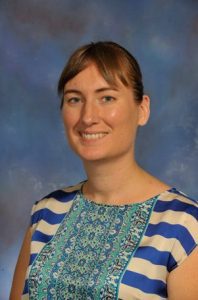 Alison Vacca is Gevork M. Avedissian Associate Professor of Armenian History and Civilization in the department of Middle Eastern, South Asian, and African Studies. Her work explores the caliphal provinces Armenia and Caucasian Albania in the seventh and eighth centuries, focusing on themes such as intercultural transmission of historical texts, quick-changing alliances in moments of intercommunal violence, and intermarriage across ethnic and religious lines.
Alison Vacca is Gevork M. Avedissian Associate Professor of Armenian History and Civilization in the department of Middle Eastern, South Asian, and African Studies. Her work explores the caliphal provinces Armenia and Caucasian Albania in the seventh and eighth centuries, focusing on themes such as intercultural transmission of historical texts, quick-changing alliances in moments of intercommunal violence, and intermarriage across ethnic and religious lines.
Dr. Vacca’s first monograph, Non-Muslim Provinces under early Islam: Islamic Rule and Iranian Legitimacy in Armenia and Caucasian Albania, was published by Cambridge University Press in 2017 and received the 2018 prize from the Central Eurasian Studies Society. She also recently completed a collaborative project to edit and translate an eighth-century Armenian history of the early Caliphate based on the oldest extant manuscript, as well as editions and translations of the correspondence attributed to an Umayyad caliph and Byzantine emperor. She is currently working on another monograph project about intermarriage and community along the Khazar frontier.
In addition to her research agenda, Dr. Vacca edits al-ʿUṣūr al-Wusṭā, the open-access, peer-reviewed journal of the Middle East Medievalists.
Contact: av3096@columbia.edu
Courses in Armenian will fulfill the language requirement at Columbia. Please check the Columbia Directory of Classes for the latest information on Armenian language classes. Undergraduate and graduate students interested in learning Armenian should check here to learn about FLAS fellowships.
The Armenian language program is designed to introduce students to the Armenian world and culture as we know it today. With a vibrant Diaspora and an expanding, flourishing nation ranked country of the year in 2018 by the Economist, Armenia is the gateway to endless opportunities.
The Armenian language program offers four levels of instruction:
Elementary Armenian I (MDES 1301) and II (MDES 1302)
In Elementary Armenian I and II, students acquire the skills to communicate about topics relating to themselves and their immediate surroundings. They read authentic materials such as signs, advertisements, timetables, and texts in the form of tales, fables, and songs in unaltered original language.
Intermediate Armenian I (MDES 2301) and II (MDES 2302)
In Intermediate Armenian I and II, students acquire the skills needed to communicate about a wide range of topics relating to the world beyond their immediate surroundings. Topics include biography, geography, travel, holidays, education, health, arts, etc. At this level, students deepen their knowledge of grammar and begin to read full-length authentic short stories, excerpts from plays, newspaper headlines, and selected passages in newspaper articles in unaltered original language.
Armenian for Heritage Speakers (MDES 1309)
The Heritage course is designed for learners who have a background in Armenian, it combines the content of the elementary and intermediate levels.
Advanced Armenian I and Advanced Armenian II (MDES 4310)
In Advanced Armenian I and II, students develop competence to communicate on topics relating to social, historical, political, and cultural issues of importance to the Armenian society and the Armenian Diaspora. They perfect their knowledge of grammar and write short essays using complex forms of the language. They read longer literary works with the use of a dictionary.
Visiting Professor in Armenian Studies
The Department of Middle Eastern, South Asian, and African Studies at Columbia University announces an opening for a part-time Visiting Professorship in Armenian Studies, under the Nikit and Eleanora Ordjanian Visiting Professorship program.
This is a one-semester visiting appointment from 1 January through 31 May 2024, with the salary of $9,000 plus travel expenses up to $5,000. The Ordjanian Professor teaches one undergraduate-level course in Armenian history, literature, art, or related areas of Armenian culture, and participates in the public outreach programs of Columbia’s Center for Armenian Studies.
The Department invites applications from scholars in the Humanities or Social Sciences whose focus is Armenian Studies. Interested candidates must hold PhD at the time of appointment and should submit a CV, syllabus and proposal of the course to be taught, and teaching evaluations.
Applications are due by 31 July and should be sent via email to Jessica Rechtschaffer at jr650@columbia.edu
Columbia University is an Equal Opportunity Employer / Disability / Veteran
Khatchig Mouradian Receives Richard G. Hovannisian Higher Educator Award
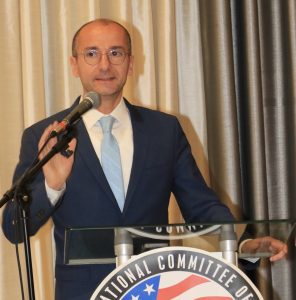 Prof. Khatchig Mouradian received the 2023 Richard G. Hovannisian Higher Educator Award at the Armenian Genocide Education Awards Luncheon held in Los Angeles on March 25, 2023.
Prof. Khatchig Mouradian received the 2023 Richard G. Hovannisian Higher Educator Award at the Armenian Genocide Education Awards Luncheon held in Los Angeles on March 25, 2023.Charry Karamanoukian Publishes Textbook in Armenian
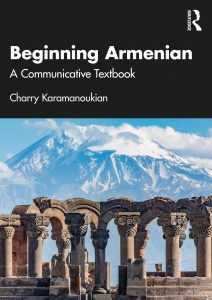
Beginning Armenian: A Communicative Textbook introduces conversational Western and Eastern Armenian in a single volume, allowing learners to acquire the language skills they need to communicate and to reference, contrast, and compare both standards of the language.
This book contains 24 lessons, each providing a range of key vocabulary and addressing different topics of daily life, including greetings, people, and objects, as well as past and future plans. An overview of the Western and Eastern Armenian alphabet, pronunciation, and punctuation is complimented by a range of exercises introducing the basics of Armenian grammar and vocabulary, with interactive information gap and role play activities designed to develop essential conversation skills.
“This is a wonderful textbook where Eastern Armenian and Western Armenian are presented together alongside English translations and transliterations, enabling learners with diverse language backgrounds to study the Armenian language comprehensively with ease and fun. The author guides learners from Ա (A) through the alphabet, grammatical foundations, and practical vocabulary. The clear explanations and interactive, real-world exercises make it a terrific resource for learners and teachers alike. Whether you are preparing for a trip to Armenia, to interact with Armenian native speakers or simply satisfy your desire to learn the old and beautiful Armenian language, this textbook will help you reach your goal and enjoy the experience.”
Svetlana Ghazaryan Wilson, International Center for Language Studies (ICLS), Foreign Service Institute, USA
“Beginning Armenian presents easy to understand vocabulary in Armenian that makes the language accessible to novice learners of all ages and anyone with a general interest in the Armenian language. The exercises, also presented with accessible vocabulary, emphasize everyday conversation and real-life situations (acquaintance, family, occupation, study, etc.) and the textbook is organized in a clear and unencumbered style.
The logical connection between the lessons, the repetitions and novelties in the exercises make the textbook interesting and enjoyable for the user. This book is recommended for university students, all beginners, and anyone with a general interest in the Armenian language.”
Ishkhan Chiftjian, University of Hamburg, Germany
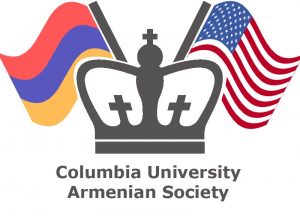
The Columbia University Armenian Society (CUAS) is a non-political and non-religious organization with the goal of uniting students of Armenian descent and promoting Armenian culture, heritage, and history on Columbia’s campus. CUAS often works with other Armenian and non-Armenian organizations, both on and beyond our home campus, in order to coordinate projects in accordance with the society’s mission. In the past, we have organized social events, joint cultural gatherings, and demonstrations (such as vigils), bringing the Armenian community at Columbia together and raising awareness of Armenian issues.
Contact: Victoria Ani Melkonyan, President of CUAS. Email: v.melkonyan@columbia.edu

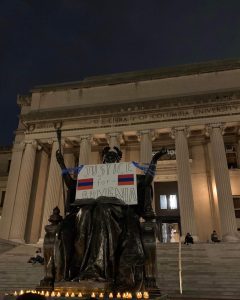
The Armenian Center at Columbia began in 1976 when a group of prominent members of the Armenian community decided to raise enough money to establish Armenian Studies on a permanent basis in the University’s curriculum. By 1979 that goal was accomplished and the Gevork M. Avedissian Chair of Armenian history and Civilization was established. Since 1979, courses in Armenian language, history and literature have been provided for students preparing for M.A., M.Phil and Ph.D. degrees in Armenian Studies and in other fields.
- The Krikor and Clara Zohrab Scholarship Fund, which provides fellowships to graduate students specializing in Armenian subjects.
- The Acopian Library Fund, which provides funding for the acquisition and cataloguing of a permanent Armenian library collection.
- The Fesjian Fund for Academic Publications, which provides for the publication of texts and scholarly books.

